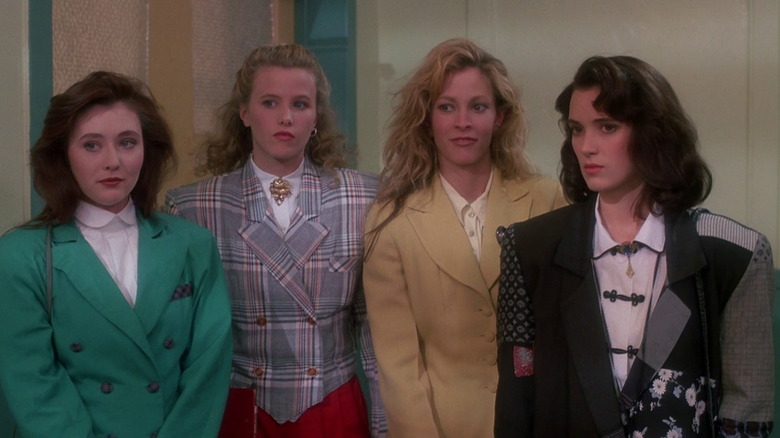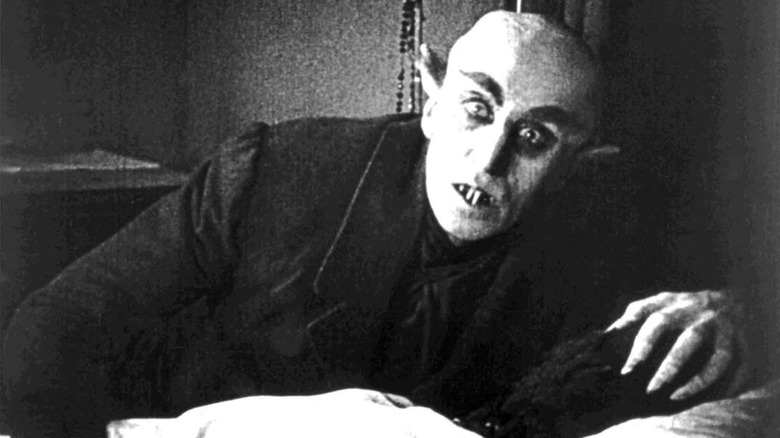The Bleak Future Of Streaming Suggests A World Without Cult Classics
An ugly trend has (re)emerged in the streaming era. Regardless of the time, energy, creativity, and passion put into a film or TV series, those in positions of power at film and TV studios can seemingly erase a project out of existence in order to file it as a loss on their taxes. It's especially worrisome considering many of these movies and series aren't given physical or digital releases outside of streaming, giving the impression that they've been exiled into nothingness. There are no rogue VHS tapes circulating around secondhand stores just waiting to wind up in the right hands. It's as if we've been thrown back into the 1970s or '80s, when a show being cancelled often meant there was never any way to see it again.
This is a ghastly practice no matter how you look at it (unless you're the type of loser who recreationally brown-noses billionaires on social media), but it also indicates an especially worrying trend in regard to cult films. After the latest announcement of streaming project dumping, a viral tweet from Miller Ross directly addressed how these decisions will directly impact the future of cult films:
"There will never be another cult classic. If your movie or show underperforms, it will be removed from sight, and that eventual groundswell of support that's turned everything from 'Blade Runner' to 'Heathers' from disastrous flops to huge successes will never find it. The end."
Cult films are the lifeblood of so many cinephiles, and imagining a world without them points to a bleak and sanitized existence. Ross has a point. Streaming apps have become one of the dominant methods of consuming entertainment, effectively killing the rental market and continuing to choke out cable television. Cult classics existed before home video, and certainly before streaming, but we still have to wonder: Does the bleak future of streaming suggest a world without new cult classics?
What makes a cult film?
Critics, theorists, and historians haven't been able to nail down a simple, specific definition of what it means to be a cult film, because it's impossible to tag a shorthand explanation to a phenomenon so vast and intricate. The origins date back to when controversial films were suppressed by the powers at be and only kept alive by grassroots fans and the absolute heroes who refused to destroy prints.
There are the obvious cult films that boast devoted fanbases who show up to every screening and quote every line at the screen, but there are also cult films that exist because they capture a forgotten moment in nostalgia, cult films that speak to a highly-specific lived experience and are therefore forgotten by the masses, cult films that reflect fads of a time period, cult films whose popularity were sparked ironically, cult films that have been reassessed in new ways from the time of release, and of course, cult films that appease the hipster need of "knowing about a movie before it was cool."
But if I had to come up with a definition, I'd say that cult films are those that birth a dedicated audience that understands their love of the film exists on the fringe. Cult films do not fulfill the unspoken requirements of mainstream cinema, and therefore inherently reject the desire to appease the status quo. How a film consummates that rejection can take a variety of forms, but it almost has a "you'll know it when you see it" vibe. For example, "The Big Lebowski" was not a financial disaster at the box office, but it can be classified as a cult classic due to the cult-like fandom that surrounds it, including the legitimately recognized religion of "Dudeism."
Cult films can both resonate with specific subcultures in society or even develop their own. A great example of this is the love of Brian De Palma's "Phantom of the Paradise," a film (and personal favorite) that was a colossal box office failure in every market ... except in Winnipeg, Manitoba in Canada, where the film is still celebrated like it's "Star Wars."
The Heathers parable
1988's teen black comedy "Heathers" is considered a seminal staple of the teen girl movie genre, and has sparked numerous entertainment tie-ins over the last 35 years. The film was given a TV series reimagining in 2018, given the musical theater treatment (which has become one of the most popular shows for community and educational theaters around the country), and is continually name-checked in promotional materials for other edgy teen films like "Thoroughbreds" and most recently, "Do Revenge." With such a pedigree, one would think "Heathers" had the same financial success as a John Hughes movie, but that's not the case.
"Heathers" was famously a box office bomb, earning only $177,247 in its opening weekend, eventually grossing only $1.1 million in the United States over five weeks against a $3 million budget. The film was pulled out of theaters following the short run because it was obvious people weren't going to turn out to see it. But the following year, New World Video put the film out on VHS and LaserDisc, and the film quickly gained a cult following through the home video rental market. Those who had seen the film in theaters quickly spread the word to their friends, and suddenly, "Heathers" was this cool film to enjoy that felt punk rock for loving because it didn't do well in theaters. "Heathers" became an embodiment of "if you know, you know."
The film has become the benchmark of when a cult film goes mainstream, because this financial flop has since been reevaluated as a classic and certainly made back its budget and then some ... even if it took a little longer to do. But had "Heathers" been tossed into a vault instead of given the home video treatment, none of this would have happened. Would we have "Mean Girls" without the cult success of "Heathers?" Absolutely not.
How else do films become cult hits?
The post-theatrical success story of "Heathers" is rightfully attributed to the home video market, but it's important to remember that cult films come in many forms, and plenty gained their respective followings without the assistance of a Blockbuster membership card. F.W. Murnau's "Nosferatu" was legally supposed to be destroyed at the request of Bram Stoker's estate due to its unauthorized connection to "Dracula," but thanks to a handful of surviving prints, the film is now rightfully hailed as a foundational classic.
As time went on, many cult films were developed through midnight movie screenings, or when movie theaters would program something a bit off the beaten path, curated by good taste and a love of cinema instead of whatever the studios were peddling at the time. This is how subversive, queer filmmakers like John Waters and exploitation mavens like Russ Meyer were able to thrive. By labeling something a "midnight movie," there was an immediate understanding that what you were about to see was special, and likely too much (in whatever way that might mean to you) for your average moviegoer. Embracing a midnight movie felt like joining a secret club of cinephiles, but also fundamentally changes the way a viewer digests cinema.
For example, a film like "Cannibal Holocaust" is known for its violent depictions of cannibalism, with many audiences treating the film like a litmus test of extreme depravity. At the same time, the film is only able to shock by exploiting fears of racism, xenophobia, misogyny, and animal cruelty. Part of the longevity of the film is understanding that it is both transgressive and offensive, and analyzing the ways those truths intersect.
There's also a communal aspect to cult films, whether literally, in the sense of something like "The Rocky Horror Picture Show" or even Tommy Wiseau's "The Room," but also metaphorically. Until very recently, the mockumentary "Drop Dead Gorgeous" was relatively hard to come by, which meant finding another person who was a huge fan of the film could instill an immediate kinship between strangers.
Make no mistake, streamers are screwing up
The panic is real because what makes the streaming deletion different than a lost reel of film or VHS tape is that many of these projects exist somewhat in the abstract. Short of a jump drive in someone's office, when these streaming exclusives get removed from streaming platforms, there's no tangible proof that the full, completed work still even exists. And it's a shame, because streamers have continually proved to themselves that they're an excellent resource for audiences to find something they didn't know they loved, even if it takes a while. During the lockdown era of the pandemic, a film like "Barb and Star Go To Vista Del Mar" was a godsend thanks to video on demand technology. Had we not all been trapped inside and consuming entertainment as if our lives depended on it (because it did), a film this weird would have probably gone unwatched by the masses. The film only made $32,825 in theatrical revenue, but ended up on a lot of critics' best-of-the-year lists.
Additionally, the Netflix top 10 is proof positive that there is a space for aftermarket appeal through streaming. Any given week, the top 10 is expectedly filled with new arrivals, but also frequently features some forgotten-about action film from the 2000s. Before streaming, these would be the types of films that would play randomly on a Sunday afternoon and inspire your dad to take a break from yard work to watch an action star punch a bank robber or save America. But now, they wind up on the Netflix top 10 list and inspire legions of film fans to ask, "When the hell did Owen Wilson and Pierce Brosnan star in a xenophobic action thriller?"
TikTok feeds are flooded daily with content creators sharing 3-5 minute clips of shows and movies, with comment sections flooded with users asking "Where can I watch this?" A few months back I found myself clicking through clips of a show I had never seen and was convinced it was an ad for something new. Nope. It was a 2017 episode of the Netflix show "Working Moms," a series I had no idea even existed because of market saturation. But lo and behold, the moment I opened the app, "Working Moms" was trending.
Cult films will prevail
Thankfully, streaming is not the only way we consume media, and as horrific as the trend has been to strip shows and movies from platforms and drop-kick them into the endless void, these projects will never fully disappear. Pirates will become preservationists more than they already are. Laid-off employees will (hopefully) snag things off hard drives before turning in their parking garage badges. While the days of VHS tape sharing have ended, the process of finding cult films is still the same — it's just evolved.
Cult films will always be uncovered in some form, it just won't be the "random page on a streaming app" the way it has been for the last few years. If there's any justice in the world, the word-of-mouth legends of these hard-to-find films will only inspire more people to seek them out, and perhaps we'll even be lucky enough to see a rise in directors' road shows where public screenings feel like the carnival is in town.
Yes, it's going to be harder. Yes, it's going to mean that the normies who don't actively seek these types of films out will be left in the cold until dedicated enthusiasts get loud enough to make an impact. And yes, it does mean that it will take a lot longer for these seemingly "lost" films to find their audience.
But as long as people are making weird, subversive, and provocative films that were never meant to appeal to four-quadrant audiences, there will be those dedicating their time to finding them and making sure like-minded folks can enjoy them, even if it means putting the "underground" back into underground cinema.
We will still have cult films, but they will live on in spite of streamers, not because of them.





